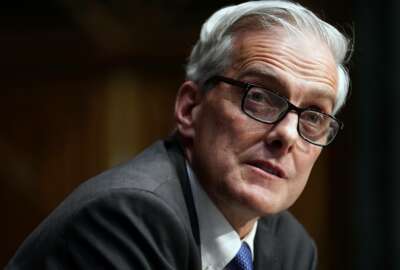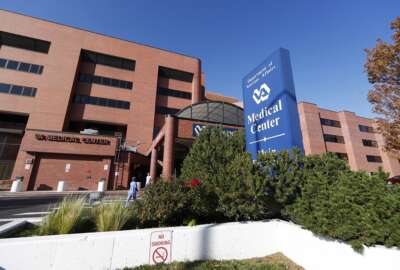McDonough says ‘tighter fiscal picture’ at VA requires careful planning to continue health care hiring
The Department of Veterans Affairs plans to keep hiring for its health care workforce this year, but at lower levels than last year.
The Department of Veterans Affairs plans to keep hiring for its health care workforce this year, but at lower levels than last year, when it saw record workforce growth, according to some of its top leaders.
VA Secretary Denis McDonough told reporters Monday that the Veterans Health Administration is managing its workforce in a “tighter fiscal picture,” but added that the department is taking a more targeted approach to hiring, after the agency exceeded its hiring targets last year.
“Where we’re not hiring, it’s not because we haven’t been able to hire. It’s because we don’t have a need. Why would we not have a need? Because we just had a great year of hiring,” McDonough said at a monthly press conference at VA headquarters.
McDonough told reporters last month that “as it relates to VHA, there may be times when we determine that there are personnel that we don’t need going forward” — and that the agency may need to manage its overall headcount through attrition.
Federal News Network reported last week that VHA recently advised medical center leaders and human resources professionals on rescinding tentative or final job offers made to prospective employees. VHA, according to emails obtained by Federal News Network, told officials to only rescind job offers only as an “action of last resort.”
McDonough, however, stressed to reporters on Monday that there is no nationwide hiring freeze or hiring pause, and there are no plans for a hiring freeze or reduction in the VA health care workforce.
“The idea that we have a hiring freeze is not correct,” McDonough said. “The idea that we are looking carefully at hiring is correct.”
Under Secretary for Health Shereef Elnhal told reporters that VHA “will continue to “strategically hire in areas where we know veteran care demand will be, and in geographic areas where we know veteran growth is the most.”
“I’ve tried to make that clear to all of our medical centers, clinics and healthcare workers: we will need to hire fewer staff this year. And again, that is because of the excellent hiring year we just had,” Elnahal said.
VHA hired more than 61,000 employees in fiscal 2023, its fastest rate of growth in 15 years. The agency grew its total workforce by more than 7%, and now has more than 400,000 employees for the first time in its history.
In addition, efforts to boost retention have led to a 20% decrease in staff turnover between 2022 and 2023.
Elnahal attributed that lower turnover rate to VHA tapping into retention and recruitment incentives under the PACT Act “to a very large extent.”
The PACT Act, signed into law in 2022, expands VA health care and benefits eligibility for veterans exposed to toxic substances during their military service.
“Congress put that in the bill, and we asked for those authorities, because we wanted to better retain and recruit the best health care talent out there,” Elnahal said.
McDonough said VHA “did a really good job of hiring last year,” and “as importantly, did a really good job of retaining providers.”
“That will, obviously, inform our decision later this year about how we execute on year two of the five years that we have for these special employment tools that came with the PACT Act,” he said.
While Congress has yet to pass a comprehensive spending deal for fiscal 2024, and must act to avoid a partial government shutdown this Friday, VA and VHA are funded through advance appropriations.
“We believe we have the funding we need across VHA in the health care system to be able to meet veteran care needs and support our base of FTEs,” Elnahal said.
“We are not in a budget shortfall. We have the funding we need to be able to execute on the veteran care mission — and various leaders throughout the system made projections on different scenarios, to be able to manage to that. But I’m not concerned about a funding issue at this point,” he added.
Elnahal said VHA is “taking sensible steps, where we can, to be able to meet the veteran care mission, most importantly, but also live responsibly within what we expect our budget to be, over the next couple of years.”
“I wouldn’t differentiate at all what we’re going from any organization that has a mission, FTEs and a budget,” Elnahal said. “Ultimately, though, I think we have the end-strength, overall, across the system, and we’re providing maximum flexibility to our hospitals and clinics to do what they need to do to execute on that mission.”
VHA is looking to raise workforce productivity, after a record year of hiring, and increase the number of health care appointments available to patients.
“We well exceeded our hiring goals last year, which is a good thing,” Elnahal said. “It means that we are at the end strength that we need to be able to serve veterans. And so, just like any organization does, you have to have an FTE level that’s able to meet the mission and is supported by the budget — and that’s what we’re doing this year.”
Shutdown impacts VA’s veteran outreach to veterans, McDonough warns
Lawmakers passed a third stopgap spending bill last month, keeping current spending levels in place through March 1 for some agencies, and through March 8 for others. Funding for VA expires on March 1.
McDonough said there would be no impact on veteran health care in the event of a government shutdown. Burials would continue at VA national cemeteries, and VA would continue to deliver benefits to veterans — including compensation, pension, education, and housing benefits — as well as process appeals.
“However, we would not be able to conduct most outreach to veterans,” McDonough said.
Most public-facing regional offices would be closed, and regular operations — including career counseling, military transition assistance and cemetery grounds maintenance — would not be available.
“A shutdown impacts our ability to conduct our outreach to veterans,” McDonough said. “I’m concerned about that, and that’s among the reasons I’ve been arguing for months that we need a full-year appropriation from Congress.”
Under the debt ceiling deal that President Joe Biden signed into law last year, if lawmakers don’t reach a comprehensive spending plan by April 30, it would trigger an automatic 1% across-the-board spending cuts in nondefense, discretionary spending.
The threat of a partial government shutdown comes as the VA is accelerating the eligibility timeline to enroll in VA health care under the PACT Act.
On March 5, all veterans exposed to toxic substances and other hazards during military service — at home or abroad — will be eligible to enroll directly in VA health care without first applying for VA benefits.
That includes all veterans who served in the Vietnam War, the Gulf War, Iraq, Afghanistan, the global war on terror, or any other combat zone after 9/11.
President Joe Biden announced this accelerated PACT ACT eligibility timeline last November, on Veterans Day.
The accelerated PACT Act deadline means millions of veterans are becoming eligible for VA health care up to eight years earlier than what was written into the law.
Elnahal said veterans don’t need to be sick or file a claim to be eligible for VA health care. All they have to do is demonstrate they served in one of the given locations, or participated in activities that could have exposed them to toxins or hazards.”
“If you don’t think you need this care today, you might need it tomorrow, or the next day, or 30 years from now,” Elnahal said. “Remember that when you enroll in VA health care that enrollment means access to care for life.”
Copyright © 2025 Federal News Network. All rights reserved. This website is not intended for users located within the European Economic Area.
Jory Heckman is a reporter at Federal News Network covering U.S. Postal Service, IRS, big data and technology issues.
Follow @jheckmanWFED






